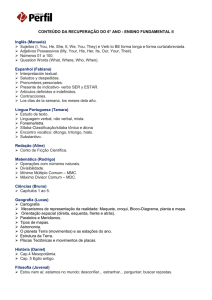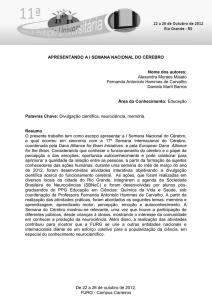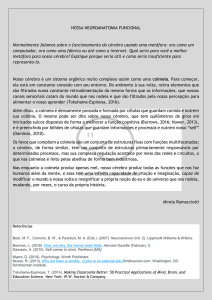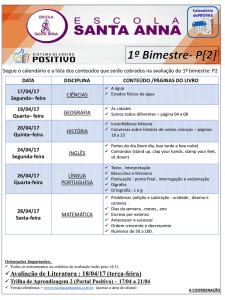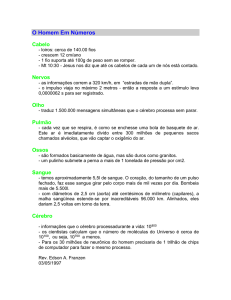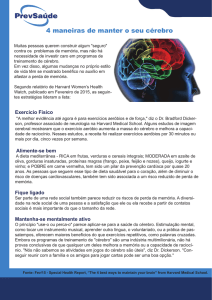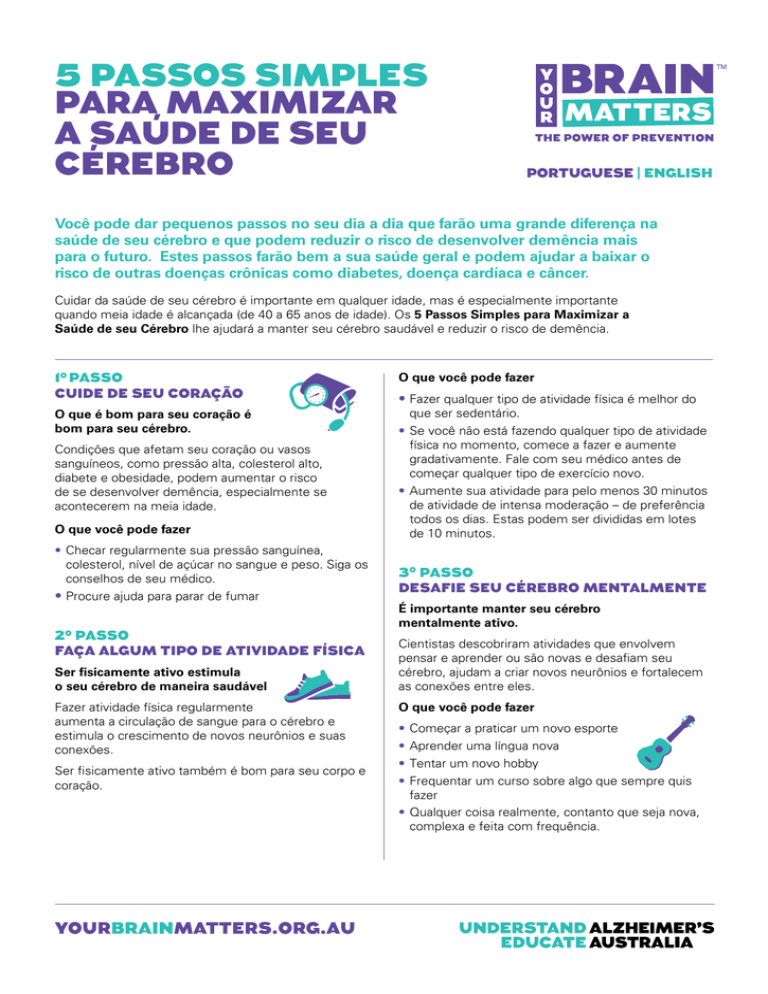
5 PASSOS SIMPLES
PARA MAXIMIZAR
A SAÚDE DE SEU
CÉREBRO
PORTUGUESE | ENGLISH
Você pode dar pequenos passos no seu dia a dia que farão uma grande diferença na
saúde de seu cérebro e que podem reduzir o risco de desenvolver demência mais
para o futuro. Estes passos farão bem a sua saúde geral e podem ajudar a baixar o
risco de outras doenças crônicas como diabetes, doença cardíaca e câncer.
Cuidar da saúde de seu cérebro é importante em qualquer idade, mas é especialmente importante
quando meia idade é alcançada (de 40 a 65 anos de idade). Os 5 Passos Simples para Maximizar a
Saúde de seu Cérebro lhe ajudará a manter seu cérebro saudável e reduzir o risco de demência.
1O PASSO
CUIDE DE SEU CORAÇÃO
O que você pode fazer
O que é bom para seu coração é
bom para seu cérebro.
que ser sedentário.
•Se você não está fazendo qualquer tipo de atividade
física no momento, comece a fazer e aumente
gradativamente. Fale com seu médico antes de
começar qualquer tipo de exercício novo.
•Aumente sua atividade para pelo menos 30 minutos
de atividade de intensa moderação – de preferência
todos os dias. Estas podem ser divididas em lotes
de 10 minutos.
Condições que afetam seu coração ou vasos
sanguíneos, como pressão alta, colesterol alto,
diabete e obesidade, podem aumentar o risco
de se desenvolver demência, especialmente se
acontecerem na meia idade.
O que você pode fazer
•Checar regularmente sua pressão sanguínea,
colesterol, nível de açúcar no sangue e peso. Siga os
conselhos de seu médico.
•Procure ajuda para parar de fumar
2O PASSO
FAÇA ALGUM TIPO DE ATIVIDADE FÍSICA
Ser fisicamente ativo estimula
o seu cérebro de maneira saudável
Fazer atividade física regularmente
aumenta a circulação de sangue para o cérebro e
estimula o crescimento de novos neurônios e suas
conexões.
Ser fisicamente ativo também é bom para seu corpo e
coração.
•Fazer qualquer tipo de atividade física é melhor do
3O PASSO
DESAFIE SEU CÉREBRO MENTALMENTE
É importante manter seu cérebro
mentalmente ativo.
Cientistas descobriram atividades que envolvem
pensar e aprender ou são novas e desafiam seu
cérebro, ajudam a criar novos neurônios e fortalecem
as conexões entre eles.
O que você pode fazer
•Começar a praticar um novo esporte
•Aprender uma língua nova
•Tentar um novo hobby
•Frequentar um curso sobre algo que sempre quis
fazer
•Qualquer coisa realmente, contanto que seja nova,
complexa e feita com frequência.
4O PASSO
TENHA UMA DIETA
SAUDÁVEL
5O PASSO
APROVEITE AS
ATIVIDADES SOCIAIS
O que você come pode afetar a
saúde de seu cérebro.
Passar tempo com na companhia da
família e de amigos ou pessoas que
você gosta de estar acompanhado, fazendo coisas
que lhe interessa, é bom para a saúde de seu
cérebro.
Nosso cérebro precisa de vários tipos de nutrientes
para funcionar direito.
O que você pode fazer
Para um cérebro saudável, escolha
•Muitas frutas, verduras e legumes.
•Gorduras e azeites saudáveis (gordura
poliinsaturadas e monoinsaturadas), como azeite de
oliva, óleo de canola ao invés de manteiga, óleo de
côco e azeite de dendê (gorduras saturadas)
•Peixe
•Leite, iogurte e queijo desnatado ou semi-desnatado
•Carne magra e peixe
Coma menos
•Leite, iogurte e queijo integral,
•Frituras, sobremesas, fast-food (alimentos ricos em
gorduras saturadas)
•Tortas, pães, bolos e biscoitos e (gordura trans)
Se você ingere bebidas alcoólicas, evite consumir mais
que 2 “bebidas padrão” quando beber.
Socializar com outras pessoas ajuda a criar novos
neurônios e fortalecer a conexão entre eles, o que
pode protegê-lo contra a demência.
Atividades que misturam ser fisicamente ativo,
interação social e que são mentalmente desafiadoras,
como dançar, fornecem um benefício ainda maior.
O que você pode fazer
•Fazer parte de um clube ou grupo social
•Juntar-se a um time, clube do livro, clube de
caminhada ou coro
•Fazer trabalho voluntário em sua comunidade
•Fazer aulas de dança
O QUE MAIS
A saúde de seu cérebro também
significa cuidar de sua saúde mental.
Visite seu médico para obter uma
opinião sobre como tratar depressão.
Também é importante evitar lesões sérias na
cabeça, então garanta que sua cabeça esteja sempre
protegida.
INFORMAÇÕES ADICIONAIS
Para mais informações sobre como ter um
estilo de vida com um cérebro saudável visite
yourbrainmatters.org.au no site da Alzheimer’s
Australia ou ligue para a National Dementia Helpline
1800 100 500
Para ajuda com o idioma ligue para o
Serviço de Tradução e Intérprete pelo
telefone no número 131 450
Este folheto fornece somente um resumo geral sobre o assunto. As pessoas devem procurar ajuda profissional para seu
cada caso específico. Alzheimer’s Australia não é responsável por qualquer erro ou omissão fetios nesta publicação.
O programa Seu Cérebro é Importante” da Alzheimer’s Australia tem o apoio funanceiro do Governo da Austrália sobre
of Fundo de Prevenção de Doenças Crônicas e Fundo de Melhora para Serviços.
© 2015 Alzheimer’s Australia
5 SIMPLE STEPS
TO MAXIMISE
YOUR BRAIN
HEALTH
There are small steps that you can take in your everyday life that will make a real
difference to the health of your brain and help reduce your risk of developing
dementia later in life. These steps are also good for your general health, and can
help lower your risk of other chronic diseases like diabetes, heart disease and cancer.
Looking after the health of your brain is important at any age, but it is particularly important
once you reach middle age (around 40 to 65 years of age). The 5 Simple Steps to Maximise
Your Brain Health will help you keep your brain healthy and lower your risk of dementia.
STEP 1
LOOK AFTER YOUR HEART
What is good for your heart is
good for your brain.
Conditions that affect the heart or blood vessels,
such as high blood pressure, high cholesterol,
diabetes and obesity, can increase the risk of
developing dementia, especially if these occur at
middle age.
What you can do
•Have regular health checks to check your blood pressure, cholesterol, blood sugar and weight. Follow the advice of your health professional
•Seek help to quit smoking.
What you can do
•Doing any physical activity is better than
doing none
•If you are currently not doing any physical activity, start by doing some, and gradually increase the amount you do. Speak to your doctor before you start any new exercise routine
•Build up to at least 30 minutes of moderate-
intensity activity on most – preferably all – days. This can be done in 10 minute blocks.
STEP 3
MENTALLY CHALLENGE YOUR BRAIN
It is important to keep your brain active.
STEP 2
DO SOME KIND OF
PHYSICAL ACTIVITY
Being physically active gives
our brains a healthy boost.
Regular physical activity increases blood flow to
the brain and stimulates the growth of new brain
cells and the connections between them.
Being active is also good for your heart and body.
Scientists have found activities that involve
thinking and learning, that are new or challenge
the brain, help to build new brain cells and
strengthen the connections between them.
What you can do
•Take up a new sport
•Learn a new language
•Have a go at a new hobby
•Start a course in something you’ve always wanted to do
•Anything really, as long as it’s new, complex, and done often.
STEP 4
FOLLOW A HEALTHY DIET
STEP 5
ENJOY SOCIAL ACTIVITY
What you eat can affect your
brain health.
Spending time with friends and
family, or people whose company
you enjoy, in ways that interest
you, is good for our brain health.
Our brain needs a variety of nutrients to function
properly.
What you can do
For good brain health, choose:
•Lots of vegetables and some fruit
•Healthy fats and oils (polyunsaturated and monounsaturated fats), such as olive oil, canola oil, instead of butter or coconut and palm oil (saturated fats)
•Fish
•Low-fat or fat-free (skim) milk, yoghurt
and cheese
•Lean or low fat cuts of meat.
Eat less:
•Full fat milk, yoghurt and cheese
•Fried food and desserts, deep fried foods and takeaway food (high in saturated fats)
•Pies, pastries, cakes, biscuits and buns
(trans fats).
If you drink alcohol, try and limit it to no more than
2 ‘standard’ drinks on any day.
Mixing with other people helps to build new brain
cells and strengthen the connections between
them, which can protect you against dementia.
Activities that combine being physically active,
social interaction, and are mentally challenging,
such as dancing, provide even greater benefit.
What you can do
•Be part of a club or social group
•Join a team, book club, walking group, or choir
•Volunteer in your local community
•Take up dance classes.
WHAT ELSE?
Brain health also means looking
after your mental health. See your
health professional for advice on treating
depression.
It’s also important to avoid serious head injury, so
be sure to protect your head.
FURTHER INFORMATION
For more information on living a brain healthy lifestyle
visit Alzheimer’s Australia’s yourbrainmatters.org.au
Or call the National Dementia Helpline
1800 100 500
For language assistance phone the
Translating and Interpreting Service on
131 450
This publication provides a general summary only of the subject matter covered. People should seek professional
advice about their specific case. Alzheimer’s Australia is not liable for any error or omission in this publication.
Alzheimer’s Australia’s Your Brain Matters program is supported by funding from the Australian Government
under the Chronic Disease Prevention and Service Improvement Fund
© 2015 Alzheimer’s Australia

